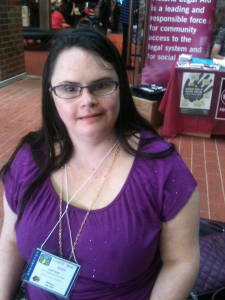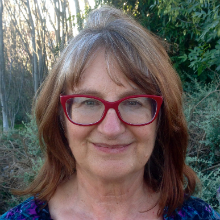Advocacy counts
Leah, 33, helps to advocate for others with an intellectual disability.
Advocates like Leah Scott know the power of good communication. It was for her communication skills that I sought her out at the ‘Having a Say’ Conference at Deakin University in Geelong in 2011. Geelong is in Barwon, one of the first launch sites for the National Disability Insurance Scheme (NDIS) and now the scheme’s headquarters.
I had come from Melbourne to support my son Julian with his personal care and communication at the Conference.
As a strong self-advocate, Leah knew how to help Julian communicate his goals. She was able to help him find a way to create a presentation on how he tries out new things and makes choices about what he wants to do in his life. From carefully watching and listening to Julian showing/telling her the things he likes to do, she came up with the idea that he could self-advocate by enacting his lifestyle choices in a dance and mime performance. He was delighted. She was spot on.
Speaking up, speaking out
A champion of independence and choice for people with disabilities, Leah writes and speaks from knowledge and experience. Her personal life has been challenged by severe health issues arising from a stroke she experienced in 2009. Despite this, she has continued, firstly, to assert her rights to participate in the community and secondly, to help others to do the same.
 As a member of VALID’s self advocacy program, Leah promotes options and choices for people engaging with residential services and Adult Training and Support Services (ATSS). She supports the rights of people to access services that suit them. If they are comfortable with attending an ATSS she would not say they are wrong. However, she wants them to know that they have the rights to individualised service plans, enabled by the Victorian Disability Act of 2006.
As a member of VALID’s self advocacy program, Leah promotes options and choices for people engaging with residential services and Adult Training and Support Services (ATSS). She supports the rights of people to access services that suit them. If they are comfortable with attending an ATSS she would not say they are wrong. However, she wants them to know that they have the rights to individualised service plans, enabled by the Victorian Disability Act of 2006.
Centre-based disability services used to be offered to suit the logistical and pragmatic orientation of service providers. Agencies are now required to be oriented to individuals and to provide supports based on a plan that reflects the personality and goals of each participant.
Leah was one of the early takers of Victorian disability funding allocated to a personally designed program of activities in the mainstream community. She insisted that her support staff be empowering, respecting her choices and treating her as an equal. She now receives support from the NDIS. She likes the flexibility it provides for her to have support she needs to enjoy life in her way. With NDIS funding, she has been able to get a scooter to help her get out and about.
Last year, Leah was on a panel interviewing and choosing new managers for a local Barwon disability service provider, Karingal.
She has not held back from saying how NDIS planning and communication could be improved. She has called for NDIS appointed planners to provide information in Plain English.
It’s good that people like Leah have a voice, speaking up about challenges and helping others to do the same. With her input the NDIS will roll out stronger and more empowering for individuals with an intellectual disability.


Join the conversation